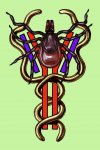This is
potentially very exciting.
@Gingergrrl ,
@justy,
@Strawberry -- other mast cell people--this is an attempt to draw a connection between mast cell problems and ME.
@Vasha thanks for tagging me and for your PM and I just discovered this thread now. I am so glad that researchers are trying to see if there is a connection between ME/CFS and MCAS (or if it is a sub-type?) or if it is just a separate disease?
I'm not sure if I've read any mast cell theories in relation to ME, or if I've read any substantial ME research involving mast cells.
My ME/CFS doctor is finding some degree of MCAS in the vast majority of his patients and as far as I know, he tests everyone for mast cell mediators (but I could be wrong on this.)
-If mast cell dysfunction turns out to be a feature of the disease (maybe in a subset, maybe more), then we'd have something that is testable, that can and should be tested for in all patients, and that . . . -can be TREATED. Like so many things we deal with, treatment is trial and error, and imperfect, but it is treatable. Treating MCAS has made a big difference in my quality of life, and it would be great if that were true for others!
We would definitely have something testable with methyl-histamine, prostaglandins, etc, and then we'd have something treatable but we'd still be light-years away from a cure. I agree that the MCAS treatments (even when I have horrific flare-ups) are the only thing that consistently have helped me. Anti-virals did nothing for me and without the MCAS meds, I am certain that I would no longer even be alive. They allow me to eat food without anaphylaxis even when other aspects of my illness remain unchanged.
Thanks fr tagging me in
@Vasha - this is my dilemma currently. I have MCAS, Lyme, EDS and M.E - my M.E dr says MCAS is because of Lyme (known through research to cause mast cell degranulation). EDS is also more common in people with MCAD'S.
Afrin believes MCAS is always a primary dx - in his book he says he doesn't go along with the view that it is secondary. My Lyme dx is clinical. Do I reall have Lyme or ME? or do I have primary MCAS? with no Dr in the UK capable of dx and treating as per Afrin then their is no hope to ever find out.
Justy, I have the same dilemma and honestly have no idea if MCAS is primary or secondary. My MCAS doc said that (in general) mastocytosis is a primary diagnosis but MCAS is secondary to something else. But in my case, I have clearly had subclinical MCAS my entire life when I look back on my symptoms (even when I was healthy and working full-time and living a normal life.) I also have POTS which is co-morbid with MCAS in a high percentage of cases although I do not have EDS. My MCAS doc even said it is possible that the phrenic nerve neuropathy that showed up on my EMG is due to MCAS/autoantibodies. This is why I am so eager to try autoimmune treatments and see if they improve my breathing, allergic reactions, and dysautonomia.
For treatment purposes, I've mostly given up on trying to figure out what's "primary" and what's "secondary" because I think it's going to be a long time before we know (and it may vary a lot by patient).
Agreed and I no longer believe I will ever know the official "title" of my illness beyond MCAS and POTS. My ME/CFS doctor is fairly certain I have ME/CFS, or a very similar illness, b/c of all my IgM+ viral titers and very low NK cell functioning (so if these some day become the biomarker, then I have the disease) but I do not meet other aspects of it so it remains confusing.
I am surprised more people on this forum aren't interested in Mast cell issues - they are quite common it seems in PWME, people with untreated Lyme, people with EDS - there is quite an overlap. Having hung around on masto/MCAD sites for a while now I am struck at how similar some of their symptoms and issues are to people with M.E - including severe ME. They have patients who are bedbound and cant do any exercise etc. I don't feel at all out of place there.
Me, too, and I think we belong to some of the same Masto boards and when I read them, I fit in 100% and have never felt out of place. Everyone there reacts to food, mold, VOC's and all of the same triggers as me.
Her hypotesis is that histamine may be one possible root cause for orthostatic intollerance in CFS, I've read.
That is interesting and would not surprise me.
I had 3 (maybe 4) experiences that could be exercise-induced anaphylaxis: about 5 minutes after finishing a triathlon, my tongue and throat would swell up for about 10 minutes.
Scott, what did you do to reverse the tongue and throat swelling or did it just go away on it's own? Back when I could exercise (over four years ago at this point and never to the level that you were at!) I would often get episodes of exercise induced asthma or prolonged tachycardia. But the majority of the time I could exercise with no issues and never had exercise induced anaphylaxis. (And I do not have asthma, this has been ruled out 100%, and have restrictive pulmonary functioning due to neuromuscular cause that remains a mystery.)

